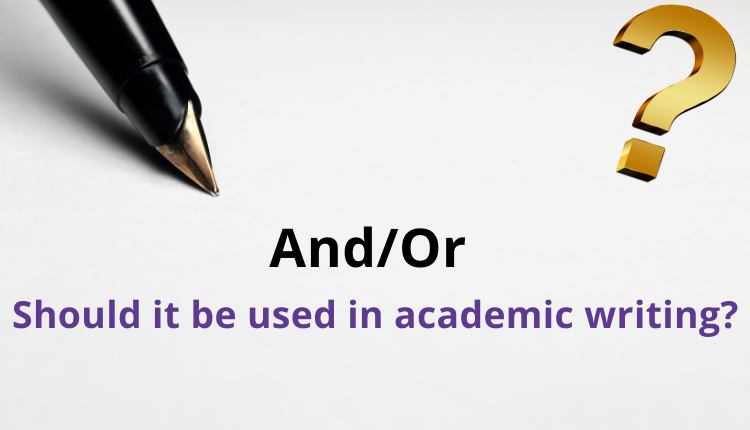Every language has its own controversies, and English is no exception. There are debates about what words are appropriate to write in what context, or the preferred style of punctuation for certain types of writing. One expression that is frequently debated is “and/or.” Is it quite clear, or is it confusing to the reader? Is it a standard and acceptable phrase to use in formal academic writing, or is it too casual? Today we’ll look at why “and/or” is such a hot topic of debate among writers in the English language, explore the potential sources of confusion for its use, and give writers some tips on how to make sure their writing can easily be understood.
Table of Content:
What Does “And/Or” Mean Anyway?
You may have seen “and/or” written in sentences that include several options. The “and/or” construction is used for several reasons, but first, let’s examine the meaning of and vs. or. The word “and” indicates two concepts together, while the word “or” indicates exclusivity: one concept out of multiple concepts. When we say “A and B,” we mean both A + B together. When we say “A or B,” we can mean A and not B, and we can mean B and not A. For a clearer example:
I would like a pizza and chips for lunch please.
I would like a pizza or chips for lunch please.
In the first sentence, I plan to eat both the pizza as well as the chips, while in the second sentence I will just choose to have one. So what does it mean when we say “and/or”? The use of the slash mark “/” in general indicates two possible options that can be chosen. Therefore, the use of the slash in “and/or” indicates that we mean “and” or also “or.” Let’s look at the same example with “and/or” below.
I would like a pizza and/or chips for lunch please.
The slash means that I will be happy to eat a pizza, OR chips, OR both pizza AND chips for lunch. In other words, the use of “and/or” has made it possible to state that there are three possible options for lunch instead of just two.
Is And/Or Clearer than Just And vs. Or?
Some editors dislike the use of “and/or” because they say that it is both unnecessary and unclear. Why is the slash “/” mark unnecessary or unclear in the context of “and/or”? There are two main arguments. The first argument is that “or” contains the meaning of “and,” and so “and/or” is redundant. For example, in the following sentence, it is possible to make the argument that it can both rain and snow and that the sentence will still be accurate.
Tomorrow it is expected to rain or snow.
In this argument, “or” is inclusive rather than exclusive. It allows for the possibility that A or B or both A and B will occur. Therefore, we do not need to write “tomorrow it is expected to rain and/or snow.”
However, “and/or” can also be somewhat confusing when used in certain contexts. Let’s look at this sentence:
Violating this rule will result in a fine of $100 and/or thirty days in jail.
Will I have to pay a fine if I violate the rule? Or will I have to go to jail? Or will I have to do both? Some people say that it is not clear. Therefore, to increase clarity, it’s better to write:
Violating this rule will result in a fine of $100 or thirty days in jail, or both.
Finally, there is the question of whether the verb that follows “and/or” should agree with the first or the second subject in the sentence. For example:
Your sister and/or your brothers plan to attend the meeting.
Your sister and/or your brothers plans to attend the meeting.
Since “sister” is singular and “brothers” is plural, is the correct verb “plan,” or should it be “plans”? While there is some disagreement on this issue, most editors and grammar guides agree that the verb should match the final subject in the construction. In this case, the final subject is “brothers,” so “plan” is correct.
What Do Editors and Style Manuals Advise?
So why do people use “and/or”? Some argue that it is out of laziness. Rather than clearly and fully writing out all of the options (A or B, or both A and B), a writer shortens the phrasing to “A and/or B.” The writer in this case might argue that it is more efficient to write “A and/or B.” Whether someone uses “and/or” due to laziness or for the sake of efficiency, it comes down to being a style choice. The MLA style manual states that “the slash…is rarely necessary in formal prose” and suggests replacing “A and/or B” with “A or B, or both.” The sixth edition of the APA style manual warns not to “use a slash when a phrase would be clearer.” The Chicago Manual of Style also prefers to avoid the use of “and/or” in formal academic and legal text due to its potential for ambiguity, although it does permit it in more casual writing. The ACS Style Guide advises against using “and/or” and recommends rephrasing the expression for clarity. Use of the slash in legal writing, which requires absolute precision and clarity of meaning, is discouraged by editors and legal scholars like Garner due to its “inherent ambiguity.” Some copy editors , and accordingly the use of “and/or,” while others hate it for the reasons described above.
Whether you choose to use “and/or” in academic writing is a matter of style, but you should definitely consider the style manual that the academic journal or your professor favors. Using grammar-checking AI software like Trinka is a great way to make sure that you aren’t using “and/or” when writing an academic paper. And remember, it is always better to err on the side of clarity than to use unnecessary slashes or punctuation.

